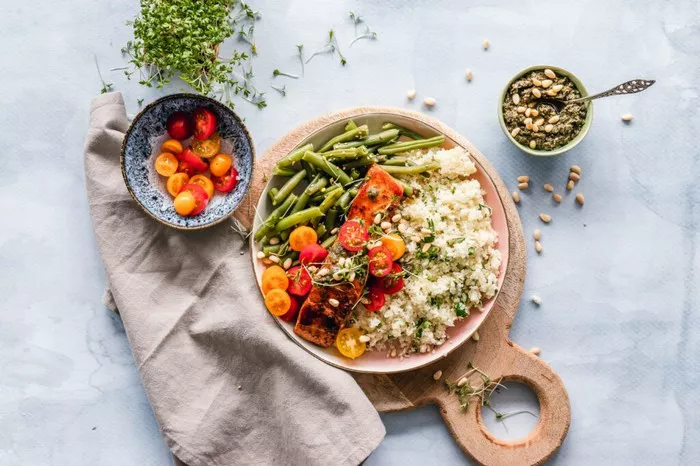Hair health is closely linked to overall wellness, and a balanced diet plays a crucial role in the growth and strength of your hair. Proper nutrition helps maintain healthy hair follicles and stimulates hair growth, preventing hair loss and brittleness. In this article, we explore the key nutrients essential for healthy hair, their role in the growth process, and the best foods to incorporate into your diet for stronger, shinier hair.
1. Vitamin C: A Key to Collagen Production
Vitamin C is vital for the synthesis of collagen, a protein that strengthens the hair structure. Collagen is the primary structural protein in hair and helps maintain the integrity of hair follicles. It also aids in the absorption of iron, another crucial nutrient for hair growth.
Sources of Vitamin C:
- Citrus fruits like oranges, lemons, and grapefruits
- Bell peppers
- Strawberries
- Broccoli
- Kiwi
Tip: Start your day with a smoothie packed with vitamin C-rich ingredients like berries, spinach, and citrus fruits. This can help boost collagen production, encouraging healthy hair growth.
2. Omega-3 Fatty Acids: Promoting Scalp Health
Omega-3 fatty acids are essential for maintaining healthy hair follicles and promoting a balanced scalp. These fats help reduce inflammation, support hydration, and enhance the overall health of the scalp, potentially preventing hair loss.
Sources of Omega-3:
- Fatty fish such as salmon, mackerel, and sardines
- Flaxseeds
- Walnuts
- Chia seeds
Tip: Include omega-3-rich foods in your diet to support scalp health and nourish hair follicles. Regular consumption can enhance hair texture and reduce dryness.
3. Biotin: Essential for Hair Follicle Function
Biotin (vitamin B7) is known to play a key role in hair health. It helps strengthen the hair and promotes follicle function, leading to healthier and stronger strands. Biotin deficiency can lead to hair thinning and even hair loss, although deficiencies are relatively rare.
Sources of Biotin:
- Eggs
- Nuts like almonds and walnuts
- Legumes such as beans and lentils
- Whole grains like oats and barley
Tip: Incorporate biotin-rich foods into your diet to maintain optimal hair health. Eggs, in particular, are a great source and can be consumed in a variety of ways.
4. Iron: Supporting Oxygen and Nutrient Flow
Iron is crucial for transporting oxygen to the hair follicles, which is essential for proper hair growth. Insufficient iron levels can disrupt the natural hair growth cycle, leading to hair loss and thinning. This is especially common in individuals who menstruate, vegans, and vegetarians.
Sources of Iron:
- Red meat and poultry
- Lentils and beans
- Spinach and other leafy greens
- Fortified cereals
- Tofu and quinoa
Tip: To enhance iron absorption, pair iron-rich foods with vitamin C-rich foods. For example, combining spinach (iron) with citrus fruits (vitamin C) can boost absorption and promote hair growth.
5. Protein: Building Blocks for Strong Hair
Hair is made up of a protein called keratin, making protein intake crucial for hair health. Adequate protein is necessary to maintain hair structure, prevent hair breakage, and support hair growth. Protein deficiency can lead to hair thinning, dryness, and slow growth.
Sources of Protein:
- Eggs
- Dairy products such as yogurt and cheese
- Lean meats like chicken and turkey
- Fish and seafood
- Tofu, lentils, and beans
Tip: Include protein in every meal to ensure your hair has the building blocks it needs to grow strong and healthy. Consider adding protein-rich snacks like nuts or a protein shake to your daily routine.
6. Zinc: Supporting Healthy Hair Follicles
Zinc plays an essential role in hair tissue growth and repair. It helps maintain the function of oil glands around the hair follicles, which keeps the scalp healthy and promotes hair growth. Zinc deficiencies are linked to hair loss, and some studies suggest that supplementing with zinc can improve hair growth in individuals with deficiency.
Sources of Zinc:
- Beef and lamb
- Pumpkin seeds
- Chickpeas and lentils
- Nuts such as cashews and almonds
- Whole grains like quinoa and oats
Tip: Include zinc-rich foods in your diet to help support the health of your hair follicles and reduce the risk of hair thinning.
7. Vitamin D: Encouraging Hair Follicle Activation
Vitamin D is essential for hair follicle cycling. It helps to activate the hair follicles and encourages the growth of new hair. A deficiency in vitamin D can contribute to hair loss, particularly conditions like alopecia areata.
Sources of Vitamin D:
- Sunlight exposure
- Fatty fish like salmon and mackerel
- Fortified foods such as milk and orange juice
- Egg yolks
Tip: Make sure you get regular exposure to sunlight or include vitamin D-rich foods in your diet. If you live in a region with limited sun exposure, consider a vitamin D supplement.
8. Water: Hydration for Healthy Hair
Proper hydration is key to maintaining healthy hair. Dehydration can lead to dry, brittle hair that is more prone to breakage. Staying hydrated supports the health of hair follicles, ensuring they receive the nutrients they need to grow.
Tip: Drink plenty of water throughout the day to keep your hair hydrated from the inside out. Aim for at least eight glasses a day.
Conclusion
While there is no miracle food that guarantees faster or thicker hair growth, a well-rounded, nutrient-rich diet can significantly improve hair health and strength. By ensuring that your diet includes essential vitamins and minerals like vitamin C, omega-3 fatty acids, biotin, iron, and zinc, you can help maintain healthy hair, reduce hair loss, and promote new growth. Additionally, regular hydration and a healthy lifestyle are crucial for supporting optimal hair health.
Remember, if you notice significant hair changes or experience persistent hair loss, it’s always a good idea to consult a healthcare professional for personalized advice and potential underlying issues.
Related topics:
- How Much Hair Should We Lose Per Day?
- Chrishell Stause’s Secret to Voluminous Hair: The Voloom 2.0 Iron
- Mermade Hair Launches in India via Tira E-Commerce Platform


